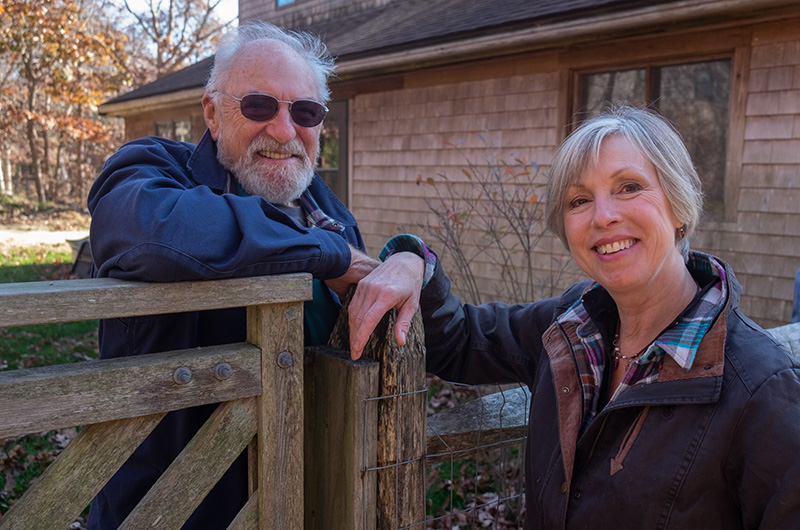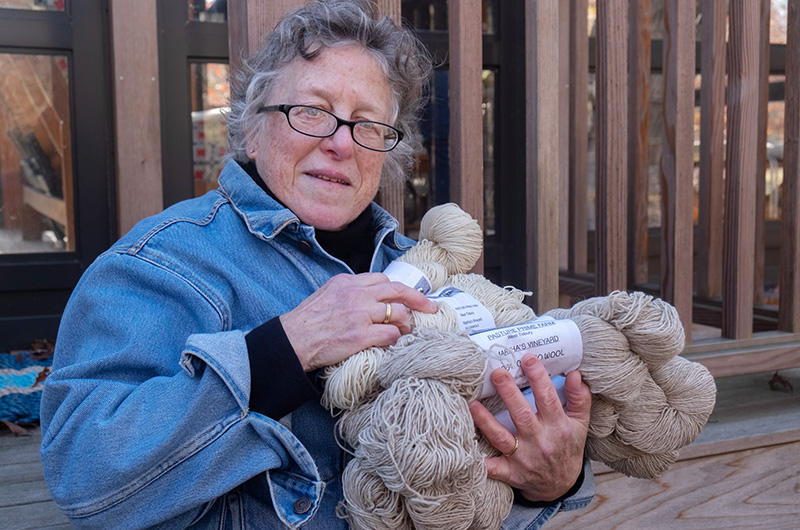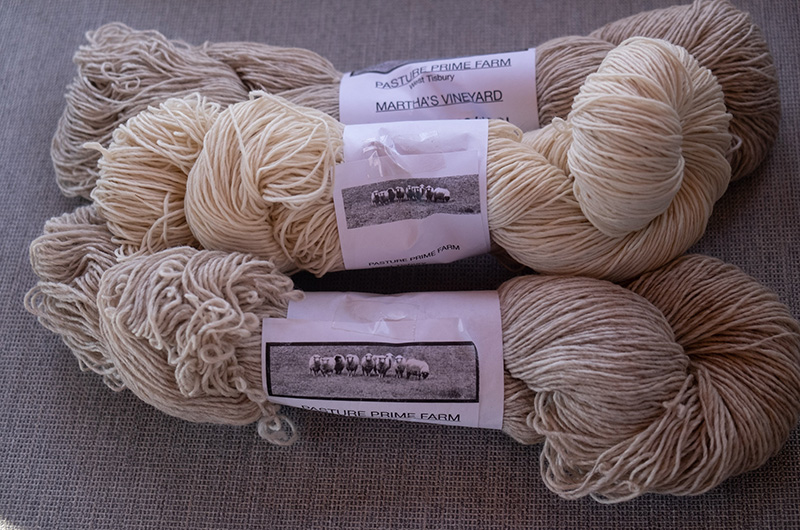Debby Ware was at the West Tisbury Farmers’ Market when she spotted the yarn. She had been professionally knitting for 40 years, but this material was unlike anything she had ever seen before on the Island. The oddest part was the man laying it out on a tablecloth, retired Island physician Dr. Michael Jacobs.
Mrs. Ware strode over to the table and introduced herself, wanting to know where Dr. Jacobs had found such fine wool.
Dr. Jacobs didn’t know how special the yarn was but he did know where it came from. His sheep.
The fateful encounter marked the auspicious beginning of Pasture Prime Farm, a small knitwear goods co-op using wool from sheep raised on Dr. Jacobs’s farm. The name was his idea.
“It’s because I am,” the 78-year-old said with a laugh. “It kind of reflected my thoughts about myself at the time. We had a prime pasture and I was perhaps past my prime.”
What makes the yarn so special, Mrs. Ware said, is the rare breed of sheep it is sheared from, the Cormo. Cormo sheep, she explained, were first introduced to the United States from Tasmania in the mid-1970s and are able to produce more wool than other sheep because of their larger frames and high fertility rate, often giving birth to twins, sometimes triplets.
She added that Cormo wool is currently the envy of knitters everywhere due to its softness, fine consistency and long-term durability.
“The Cormo is the key,” she said. “It’s like cotton. It’s so soft and squishy, and has a spring to it. It’s now a very popular and talked about yarn in the knitting world, and Michael just happens to be at the center of it by pure luck.”
Dr. Jacobs readily admits that he obtained the sheep by happenstance and had no idea of their value when he bought his first flock. It all started in 2011 soon after his retirement from the Vineyard Medical Services clinic where he practiced internal medicine for 40 years. He and his wife Genevieve were contemplating a move from their home on Lagoon Pond at the time and a 4.5-acre farm in West Tisbury caught their eye. He said they were so enamored by its bucolic beauty and the prospect of pastoral living that they bought the property before they even sold their house.
“There was no path, just a leap,” Dr. Jacobs said. “I never dreamed or thought about it. We found the farm and suddenly it was a completely unexpected, magical moment. We were taken by the beauty of the land and the possibilities of doing something uniquely different that neither of us had ever done, like farming or raising some animals.”
The couple started out by taking care of a few of Liz Packer’s sheep for a year. Dr. Jacobs said he found them easy to shepherd even with his limited knowledge and experience. Longtime Island sheep-shearer Andy Rice then gave them a tip to purchase sheep from a farm in western Massachusetts that was raising and breeding Cormo sheep. They bought a half dozen and brought them back to the farm, first selling them for butchering, but soon realizing that they were more comfortable raising the sheep for their beautiful wool. Six years later, they are still watching over nine sheep, five of which are Cormo sheep from their first flock.
“We’re small fry, just a mom and pop operation of nine sheep,” said Dr. Jacobs.
“I think the size is so perfect for what we’re doing. Most people have not heard of this wool,” said Mrs. Ware, adding that the flock produces about nine bags a year of cream and gray-colored wool.
While Dr. Jacobs quickly embraced his new role as a shepherd, he said he didn’t have a clue about the ins and outs of knitting and selling the yarn. He still doesn’t.
“I have no idea how to answer any question regarding wool and knitting,” he said. “People ask how much yarn they need to knit a sweater for their two-year-old. I don’t even know how big a two-year-old is!”
Mrs. Ware could tell Dr. Jacobs needed help when they met at the farmers’ market last spring. She volunteered to handle merchandising and selling the final product, knitted by her.
“He was so easy about me coming into his world,” she said. “I just thought it was so unique he became a shepherd, but then I realized maybe he’s been a shepherd all his life. It was sort of an instant friendship. He needed me, and I needed him. It’s a pleasant merger.”
After writing six books about knitwear for babies, Mrs. Ware knows exactly how much yarn you need to knit a sweater for a two-year-old. She said her mother taught her how to knit when she was five years old. She has knitted sample designs for Calvin Klein and started her own knitwear shop on e-commerce site Etsy. She is a regular in Island knitting circles.
“I always knit,” she said. “The knitting world is full of lovely people. You don’t go into it to make any money. It’s a passion.”
On a sunny, brisk November morning last week, Dr. and Mrs. Jacobs walked out to the small pasture where their sheep graze, stalks of grass between their teeth. Mrs. Jacobs approached first, quietly to stifle the crunching of autumn leaves underfoot. Dr. Jacobs said the shy animals often race off when he goes in by himself, so he leaves first greetings to his wife.
“They like the sound of a woman’s voice,” he said. “They don’t trust men.”
The pair walked the flock into a small pen and Dr. Jacobs retrieved a bag of apple cores, cucumbers, carrots and other uneaten salad ingredients to feed them.
“The work is continuous and it’s a big commitment to take care of the animals,” he said “I don’t consider this a hobby. I take it seriously because I think it’s an important thing to do.”
Dr. Jacobs said caring for the sheep isn’t all that different from caring for his former patients, though he said the sheep are easier to manage than a busy medical practice.
“You detect a dependency and feel a commitment to the well being of who you are caring for,” he said. “You’re responsible for their health and survival.”
Mrs. Ware said Pasture Prime business is booming, but the best part are the hours spent at the farmers’ market chatting with her new friend Dr. Jacobs.
“It’s like the stars aligned,” she said. “I wouldn’t have committed if I wasn’t as passionate about this wool as I am. This is where my heart is.”
She said she is no good around animals, but time spent with the sheep is slowly convincing her to give shepherding a try.
“He [Dr. Jacobs] wants me to learn,” she said. “You never know what’s coming in the future. I’m open to all things.”
Dr. Jacobs said Mrs. Ware might even convince him to cross over and try knitting, though he expects he’ll need extensive training.
“Not yet, maybe in a couple of years,” he said.
As Dr. and Mrs. Jacobs fed the flock, the sheep huddled together and occasionally bleated to request another bite. A sudden movement caused them to dart away in tandem. Dr. Jacobs chuckled and Mrs. Jacobs shook the bag of food. Slowly, the sheep all returned.
“I just love how they’re so aware of what’s happening around them,” Dr. Jacobs said. “I’m not reinventing myself, the animals are reinventing me.”










Comments (1)
Comments
Comment policy »